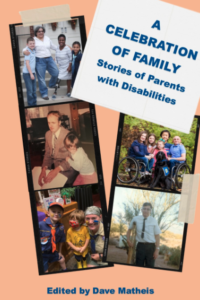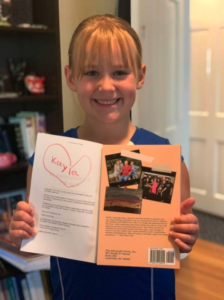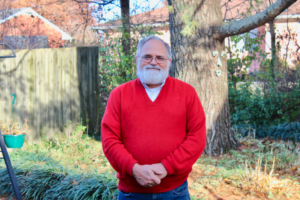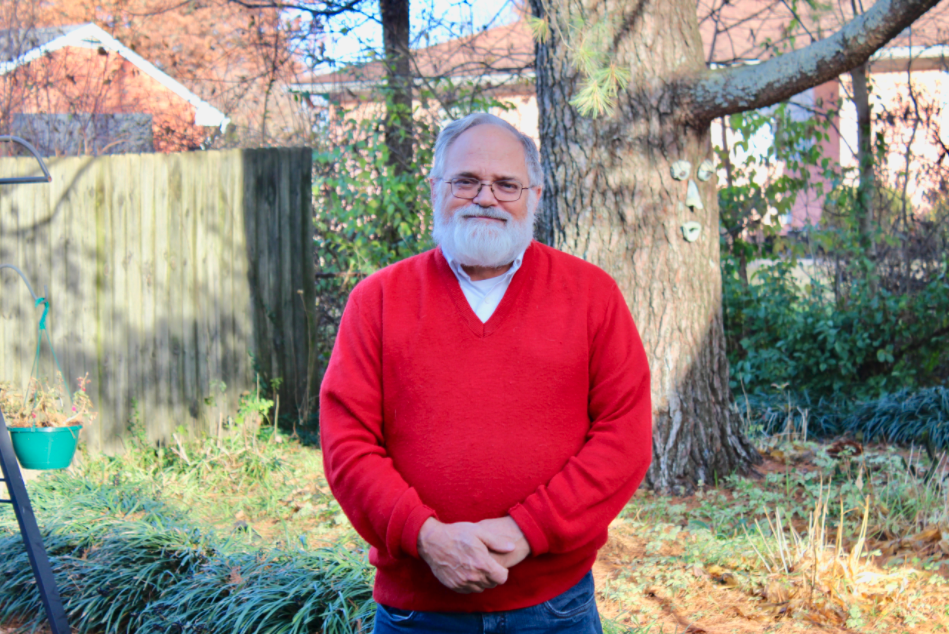New Book Features Stories of Parents With Disabilities
Writer / Grace Schaefer
Photography Provided
 When he started volunteering at the Cerebral Palsy School while studying at Bellarmine University, Dave Matheis couldn’t have imagined how much his service would change his life. At the time he was simply helping the swimming instructor with water therapy at the school, and was experiencing his first real connections with the community of disabled people.
When he started volunteering at the Cerebral Palsy School while studying at Bellarmine University, Dave Matheis couldn’t have imagined how much his service would change his life. At the time he was simply helping the swimming instructor with water therapy at the school, and was experiencing his first real connections with the community of disabled people.
While there, he met Jo Anne Donaldson, a lady whose lifelong battle with cerebral palsy gave her severe physical limitations. These limitations didn’t stop her from painting. In fact, she painted with her teeth in a special area the school staff set up for her to work. Matheis would visit with her and they became good friends. Donaldson has since passed away, but years later, Matheis still keeps two of her paintings.
It was largely her influence, and his work at the Cerebral Palsy School, that led Matheis to enter into a career connected with the disabled. After spending his career working in the Kentucky Office of Vocational Rehabilitation (OVR), he retired and began working part time with the Center for Accessible Living in Louisville. He had worked with the Center before, during projects with the OVR. Additionally, more than half the staff at the Center have a disability of some kind, allowing those with disabilities to participate in providing resources to others in similar situations.
At the Center, Matheis spoke with some of his co-workers about their experiences being parents with disabilities. Feeling that it was important to share information about parenting with disabilities, they held a few panels on the subject at conferences. Eventually Matheis made the decision to try creating a collection of stories of parents with various disabilities. Along with Jason Jones and Austin Nugent, he worked to recruit individuals with disabilities who would be willing to share their experiences in the book. The goal was to collect 30 stories of parents with all types of disabilities – physical, intellectual, mental and sensory. Most stories came from Kentucky, though to ensure representation for various disability groups, some interviewees were found out of state.
Most everyone who was asked for an interview was graciously willing to participate. When considering a certain disability to include in the collection, Matheis often found that he already knew someone with the given condition. All in all, he knew 21 of the 30 participants before their interviews were conducted. Some participants even work or have worked at the Center for Accessible Living with him.
After finding the participants, most were interviewed via Zoom calls. These calls were recorded, converted into transcripts and edited. For others, interview questions were sent and typed answers were returned. After editing, the stories were compiled into book form and titled, “A Celebration of Family: Stories of Parents with Disabilities.”
 The Center for Accessible Living helped with the project and paid Matheis as he worked on the collection. He expresses his gratitude to the Center for their support and generosity, saying that they are “responsible for the book.”
The Center for Accessible Living helped with the project and paid Matheis as he worked on the collection. He expresses his gratitude to the Center for their support and generosity, saying that they are “responsible for the book.”
Every story found within the book communicates themes of perseverance, empathy and strength to readers. A mere sampling of the stories serves to emphasize the variety of challenges and solutions interviewees worked through. There is the story of Gerry – not only did she provide a view into her disability, but also a view into the racial relations of her time. She knew Muhammad Ali in high school, she marched with Martin Luther King Jr. in Frankfort, and she worked on Jesse Jackson’s presidential campaign, even getting to meet him. Though she advocated strongly for civil rights, Gerry was also a strong disability advocate. Her disabilities did not stop her from taking strong steps towards racial equality.
Jason Jones, who wrote the book’s introduction, is also featured in the third story of the book. Beside his work on the book’s content, Jones also assisted the book by gaining the support and promotion of the local Paralyzed Veterans of America chapter. Due to sponsorship from the chapter, it was important to Matheis and his team to include a disabled veteran’s story. This desire led to the final story collected for the book – that of Tom and Junie. Their story, like all those in the collection, speaks of parenting with disabilities. Theirs, however, is told in a unique way. Tom and Junie tell their story, but their children also join in. This veteran family provides a unique view of parenting with disabilities, as they are able to show both the parents’ and children’s perspectives.
Matheis believes the collection shows “the variety of the American family.”
“Like individuals, no two families are alike,” he says.
By detailing the adaptations parents and children make in the face of disability, the stories provide poignant examples of the manifold forms family may take. Whether these are tales of children learning to buckle their own car seats, or of toddlers learning to climb onto their parent’s wheelchair, many interviewees emphasized the point that children often adapt more to their parents than their parents adapt to them. The same children who learn to help their parents with these day-to-day tasks are the children who grow up with a sense of empathy, an acceptance for others, and a sense of how and when to ask a difficult question.
 Though some may say these children don’t get the normal childhood experience, they grow up gaining something far greater than normalcy – a kind heart willing to look past the physical differences between themselves and others. These children will not find it strange to see a lady in a wheelchair. They will not be phased by a man who cannot hear. These are the children who will shine as an example to their peers of what it looks like to be kind to all, and to look past physical skills or limitations. These are the children who learn, more than most others, that it is acceptable to seek help to work around a limitation, and that it is natural to try, fail and try again. Their parents lead the way for them, and as the children adapt to their parents’ needs and vice versa, they all learn a valuable lesson in caring for others above themselves.
Though some may say these children don’t get the normal childhood experience, they grow up gaining something far greater than normalcy – a kind heart willing to look past the physical differences between themselves and others. These children will not find it strange to see a lady in a wheelchair. They will not be phased by a man who cannot hear. These are the children who will shine as an example to their peers of what it looks like to be kind to all, and to look past physical skills or limitations. These are the children who learn, more than most others, that it is acceptable to seek help to work around a limitation, and that it is natural to try, fail and try again. Their parents lead the way for them, and as the children adapt to their parents’ needs and vice versa, they all learn a valuable lesson in caring for others above themselves.
Matheis doesn’t plan for “A Celebration of Family” to be his final project, nor is it his first. He has previously edited a magazine centered on disabilities. He also wrote two church histories. Additionally, he is helping a lady with significant disabilities write her own memoir.
Matheis speaks of his upbringing, saying 16 years of Catholic education “instilled in me a strong sense of social justice.” This sense of justice is apparent in his advocacy for all disabled people and in his dream to include a comprehensive view of parenting with all types of disabilities. His book, as well as his career, provide a glimpse into a world many people may never have seen before – a world where it is natural to adapt, assist and accept. It’s a world we can all learn a lesson from. It’s a kind, willing world, and one that any person would be blessed to know.





